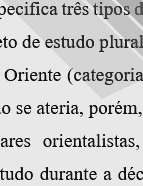

................................
Focusing specifically on the period from the late 19th century to the very death throes of the Primeira República [First Republic], they set out in search of an answer to the fall of the latter, the absence of a social revolution and the durability of the Estado Novo.
In short, considering these three phases in their entirety, from the young people whose alignment with Marxism was framed by the Second World War to those who were devoted followers after May 68, three lines of continuity may immediately be noted. First and foremost, most of the Marxist historiographical activity was conducted on the fringes of the Portuguese university, from which the Marxist historians were almost always excluded until 25 April 1974. Some worked in foreign universities, in France, Czechoslovakia or Brazil, and divided the time devoted to research with the professional tasks required of them as a source of income - in the fields of translation, journalism and advertising, but also in non-intellectual occupations. Secondly, all these historians were not only social scientists who intervened in the historiographical field, but also intellectuals who made themselves heard in the political arena. Alongside their historiographical work, they sought to denounce the regime in force in Portugal at the time and capitalism as a world system, swaying in the priority given to criticism of the latter and to the former, while also condemning Portuguese colonialism. Thirdly, themes of a political, social and economic nature predominated in the research conducted throughout the three phases under study, even though one of the Portuguese works inspired by Marxism with the greatest repercussions was in the field of culture (Saraiva and Lopes, História da Literatura Portuguesa [History of Portuguese Literature], 1954).
Problematic Strands of Marxist History
Considering that which distinguished Marxist historiography from other historiographical traditions, but also the diversity internal to any and every historiographical tradition, this text on the course of Marxist historiography in Portugal is structured around three problematic strands: (1) the national circumscription of historical space (under the banner of national independence and patriotism) and the insertion of national history in an international dynamic (under the banner of anti-imperialism and internationalism);
